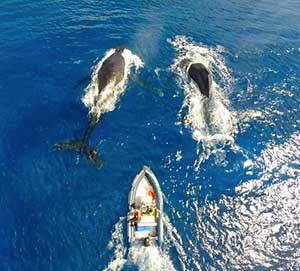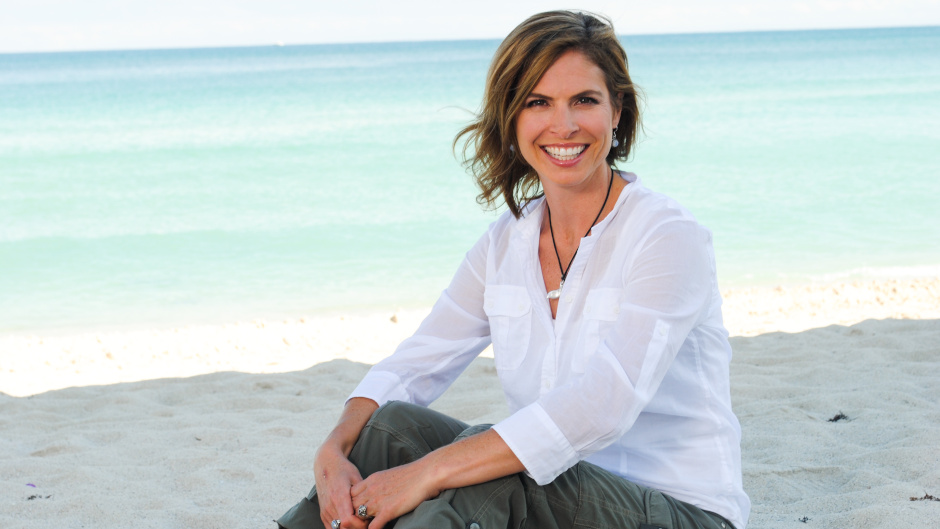After graduating from Miami Law, Barefoot worked in private practice in Miami and then at the United Nations in Switzerland. Although she greatly enjoyed her work in both venues, she paused to consider what her dream job would be. She recalled her passion for whales and dolphins as a child and learned about litigation ongoing in the Netherlands regarding an injured orca. Rescued by a dolphinarium and deemed unfit for release back into the wild, the orca had been transferred to a zoological park in Spain where it was performing for the public on a daily basis. Barefoot hopped on an airplane and went to watch the oral arguments in the case. That decision changed the course of her life.
Inspired into action, Barefoot recently relocated back to Florida where she has turned her dream into a reality. She established her own non-profit law firm, Cet Law, focusing on cetacean law (whales, dolphins, and porpoises and their habitats) in 2015.
Law was a second career for Barefoot. Initially entering the accounting field, she then pursued international development and grants management. Prior to law school, she spent three and a half years in Zimbabwe, working on furthering democracy in the country through the non-profit organization Pact, Inc.’s Zimbabwe American Development Foundation project. Befuddled by the use of the law as a tool of oppression, she then decided to pursue a law degree and, wanting to enter the field of environmental law, chose Miami Law for its strong environmental and ocean and coastal law courses and the Miami Scholars program.
Barefoot took advantage of the myriad of opportunities to gain practical experience while at Miami Law. She participated in volunteer opportunities through the HOPE Public Interest Resource Center and spent the summer after her first year at an environmental justice non-profit in Miami on a fellowship provided by HOPE. This hands-on experience helped ingrain her into the environmental community. She found the course International Environmental Law, taught by Professor Richard Williamson, to be incredibly useful and educational. The course concluded with a simulated negotiation of a treaty concerning the waters in the Antarctic. She also enjoyed participating in Miami Law’s Leipzig-Miami Seminar where she traveled to Leipzig, Germany and presented on comparative law topics. She was also Executive Editor of The University of Miami Law Review.
After graduating from Miami Law, Barefoot spent five years working at Hogan Lovells, in Miami, where she focused on environmental litigation. She was an integral member of the legal team that represented the State of Florida on multi-district litigation involving interstate and federal water disputes (known as the “Water Wars”).
After five years there, she fulfilled her childhood dream to work at the United Nations by jumping at the opportunity to work in Geneva with the United Nations Environment Programme (UNEP) as a Programme Officer. The position was ideal for her as it allowed her to apply both her law and international development background. At UNEP, she focused on post-disaster and conflict areas, working, for example, on an illegal dumping of toxic chemical waste site in Côte d’Ivoire.
 Even though she found the work at UNEP to be both challenging and rewarding, she was inspired to give up the position to focus on her true passion – whales and dolphins, after witnessing the litigation in the Netherlands. She found the name of one of the scientists involved in the litigation, Dr. Ingrid Visser, and reached out to ask if she could work with her, exchanging her legal expertise for field and practical experience. For four months, she worked with Dr. Visser’s organizations, Orca Research Trust and the Free Morgan Foundation, in New Zealand and Europe, getting hands on experience.
Even though she found the work at UNEP to be both challenging and rewarding, she was inspired to give up the position to focus on her true passion – whales and dolphins, after witnessing the litigation in the Netherlands. She found the name of one of the scientists involved in the litigation, Dr. Ingrid Visser, and reached out to ask if she could work with her, exchanging her legal expertise for field and practical experience. For four months, she worked with Dr. Visser’s organizations, Orca Research Trust and the Free Morgan Foundation, in New Zealand and Europe, getting hands on experience.
Realizing that there was a significant unmet legal need, Barefoot then decided to establish her own not-for-profit corporation specializing in cetaceans and opened Cet Law in November 2015. Her current projects include working with the Cook Islands Government and Cook Islands Whale Research to draft legislation and regulations for the Cook Islands Whale Sanctuary.
Barefoot’s advice to students is “if you see something that inspires you, find a way to go out and do it.”

